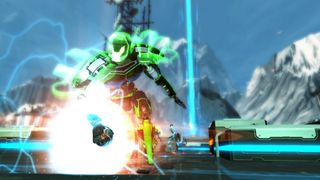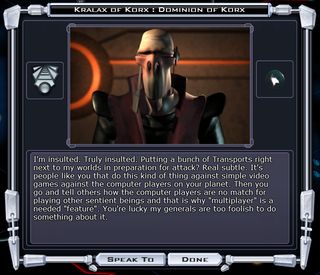Frozen Context

Every week, Richard Cobbett writes about the world of story and writing in games.
Frozen Cortex is the kind of game I find a bit intimidating. It's strategy, which is only my genre in fairly specific forms, and a robotic spin on American Football. Being British, I know really very little about the ins and outs of that subject's many complexities. Or for that matter, American Football.
I've only played a few rounds, so I'm not going to comment on the action of it too much. I can say that the Knockout mode is well named. I played it and got instantly knocked out. But what I do like, at least so far, and seems worth a look, is how Frozen Cortex sells its fictional sport. It slips in story in several ways, and all of them entirely to its advantage when it comes to making it feel legitimate, like something people are actually watching, and part of a wider world with more going on than robot games.
It's not unique in that, of course. Commentators are fairly common in this kind of game, and there's always some lore about how a particular fake-sport has managed to take the world by storm. One of my favourite examples was Super Monday Night Combat, a MOBA/FPS hybrid whose commentators made the game what it was. Others include (rolls dice) Blood Bowl, which offered its fake-sport in a fantasy flavour. The catch of most of them is that after a while you've heard everything they have to say, and there's little less funny than hearing the same joke a hundred times. Being stabbed in the eye with a fork, yes. Forced hot-sauce enemas. Very little else.

In Frozen Cortex, it helps that it's text based. That's probably more down to budget than anything else, and some roaring dialogue is always fun. Long-term though, it allows for it to be as passive as needed, yet still reinforce the basic effect of commenters chatting away from a distant booth. There's three of them, a conventional sports commentator type, an analyst, and a guy I think of as Mr. Pumpkinhead, with their lines split between quick references, random bursts, quick dialogues, and quiet reminders of mechanics like trying to sweep up bonus points before going for the touchdown. You also get the opposing team's coach chipping in at regular intervals with their own contributions, including straight-forward "That wasn't very good" type jeers and sighs, and the occasional bit of random nonsense like "My trousers are aflame with glorious triumph!" So, uh, yeah. The result is a diverting but not distracting flow of tips, reinforcements of each team's style and background, and outright gags like "This turn break is sponsored by the Grand Holy Church of the Incomparable Boz. You are weak, worthless and loved by Boz..."
A lot of the time, it's the smallest details that can make the most difference. Frozen Cortex is simultaneous turn-based strategy, and it's nice that the game acknowledges player speed - noting when you're ludicrously quick to plan your move, and the commentators tapping their toes in boredom while the opposing player figures out what to do. Between rounds, when it would have been so easy to just worry about the mechanics, you get little news stories popping up about corruption in the league, other coaches pulling crap like leaving lanes wide open for easy passes, and things that the commentators will bring up in their exchanges. I don't know how complex the story actually is, but there's a good hint that there's a fair amount going on behind the scenes. While the focus is on short seasons, the main single-player modes both make a point of saying that it continues between games rather than just pulling from a big sack of words. It'll take a good deal more play to figure that out. For now though, it's a pleasant extra layer to explore while learning the ropes of the core action.

Cortex's predecessor, Frozen Synapse, also did a better job with its script than it tends to get credit for, its story and single-player campaign unsurprisingly being a relatively small part of its sell. When you're competing against someone, you don't really care what bullshit lore reason there is behind it - it's all about the tactics and satisfaction of a shotgun. This time though, the two sides fit together well. It makes absolute sense that a sport would have these elements, and just being able to buy into a larger fiction really does make a big difference. There's a reason that games like FIFA are always going to get more attention than just any random sports game - the players, the atmosphere, the prestige are all part of the fantasy. Outright fantasy sports meanwhile have to not only present a game worth playing, but a reason to get good. The illusion of spectators, and even relatively simple simulated interest, are surprisingly effective.
While I can't so far say that the AI has the same raw personality as the Alpha Centauri crew, or the depth of some GalCiv messages, it's been doing a lot to keep me company during my variably-protracted failures at climbing the leaderboards in single-player mode. And those are high watermarks for any game to hit...
PC Gamer Newsletter
Sign up to get the best content of the week, and great gaming deals, as picked by the editors.

Uppity bloody AI opponents. But at least they're still friendlier than most Dota players.
Most Popular

